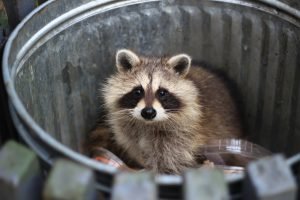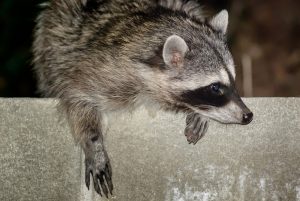
The Racoon on the Snowy Ice Sniffs to the Tracks of Another Racoon.
If you think Old Man Winter is enough to keep raccoons away, think again.
During winter months, food sources become scarce, and weather becomes frigid, which can drive raccoons to seek food and shelter in human environments. Consequently, raccoon populations are higher in suburban and urban areas than rural areas.
With their masked faces and ringed tails, they may look cute, but raccoons can be real pests. The average raccoon is 2-to-3 feet long and weighs 10-to-30 pounds. Though relatively tiny, these critters can cause some big damage.
Raccoons wreaking havoc
Raccoons can cause considerable destruction by dumping and tearing through garbage cans, scratching vehicles by climbing on or over them, and digging up gardens and bulbs planted in the ground.

raccoon in a trash can
If raccoons make their way inside your home, you can have even bigger problems. Raccoons can nest in your home, not only creating a noisy disturbance, but also damaging insulation, critical wires, and more.
According to the Ohio State University Extension, raccoons are one of the species most commonly affected by rabies in Ohio. Roundworms often found in raccoon feces can infect humans and pets, and raccoon urine can carry leptospirosis, which can be transmitted to humans who come into contact with contaminated soil. All of these things make it a good idea to prevent these pests from being near you, your home, or your family.
Could I have a raccoon problem?
Raccoons tend to be nocturnal, so they are active and hunt for food at night. If you hear scuttling and thumping in your walls or attic at dusk and dawn, you may have raccoons in your home. Raccoons can enter a wall of a house at the foundation and crawl up to the top.

A curious North American raccoon is peeking over a wall in California suburban house.
They also nest under decks and in sheds.
What attracts raccoons?
Raccoons are not picky eaters. According to the University of Maryland Extension, raccoons feed on almost anything available, including fruits, berries, grains, nuts, cat and dog food, fish, frogs, reptiles, rabbits, and eggs.
Tips for discouraging raccoons
- Eliminate all outside food sources, including garbage cans, cat and dog foods, compost piles, and bird feeders
- Though convenient, don’t use patios and porches to store beverages and other foods in the winter
- Make sure any entry points to attics and chimneys are sealed and secured
- Be extremely careful around raccoons that are acting uncoordinated, lethargic, or aggressive, as these are signs of rabies
A professional pest control specialist can examine your attic, as well as the foundation of your home and walls, for droppings, nests, fur or hair, to determine if you have a raccoon problem. If raccoons are causing a disruption in your life, contact A-1 Able Pest Doc at 1-800-737-8189 to have them safely removed from your home.

Recent Comments